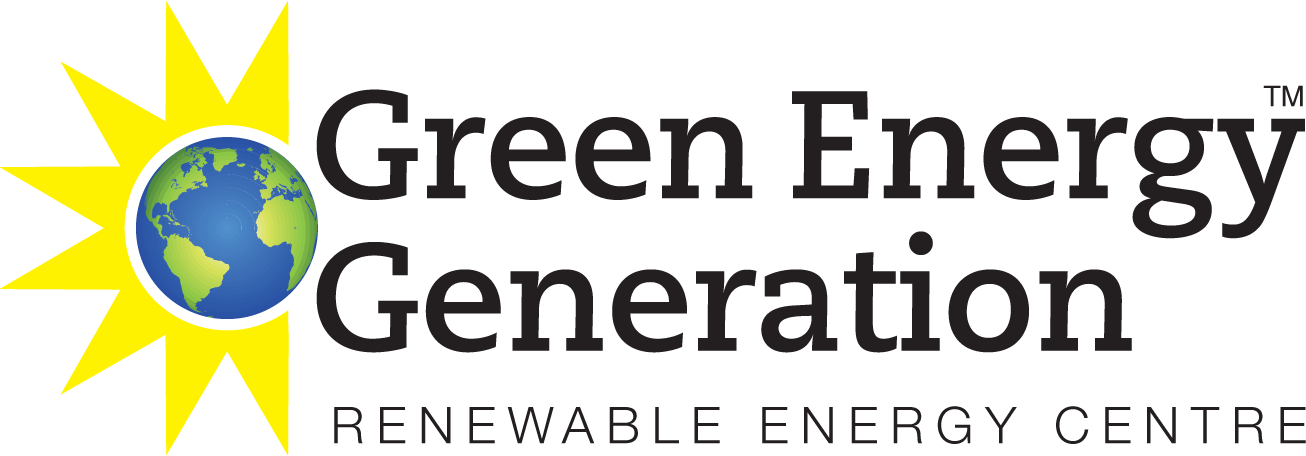Energy Saving Ideas

It is a true fact that we homeowners are always looking for ways to reduce our energy bills, whether it is turning off lights as we depart from a room, or closing shut an open door to retain heat. As little and as simple as these things sound - they work! Easy and cost effective measures around the home can have a significant impact on our energy bills as well as reducing our CO² emissions that contribute to global warming.
Saving energy around the house
Navigate through our energy saving house to find out some ways in which YOU could save money in YOUR home!
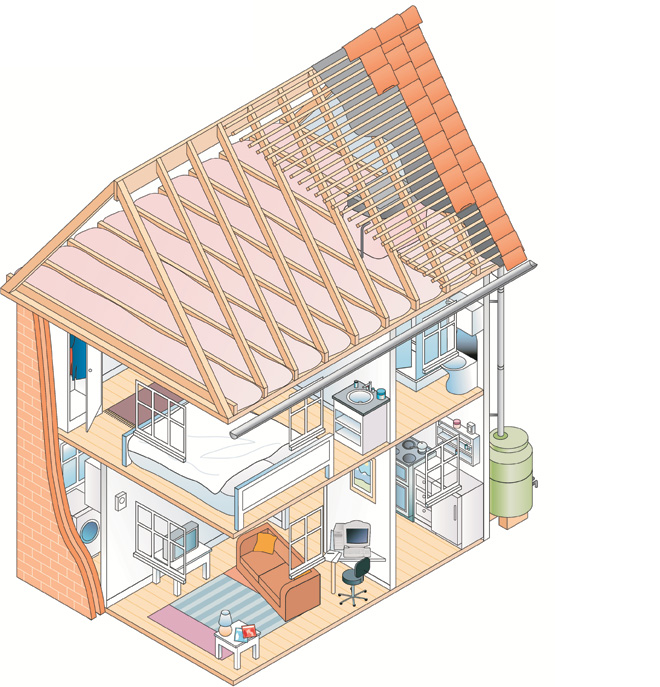
Top Tips
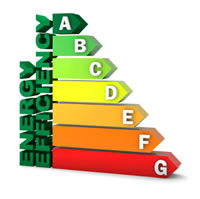
- Energy Saving Lightbulbs - save £5-10 per year with a cost recovered in about 6 months
- Hot water tank insulation - save £10 per year and the cost is recovered in 1 year
- Draught proofing - save £35 per year with the cost recovered in 3 years
- Heating Controls - save £50 per year with a cost recovered in 2-5 years
- Double Glazed Windows - save £40 per year and the cost is recovered within 5 years
- Loft Insulation - save £80-£100 per year recouping the cost in 2-6 years
- Cavity Wall Insulation - save £130 per year and recoup the cost in 3 years
- Replace an old boiler - save £120-£200 per year and recoup the cost in 4-5 years
Facts & Figures
- Replacing an old G-Rated boiler with an A-Rated boiler as well as a full set of heating controls could save you around £300 a year and 1.2 tonnes of carbon Dioxide.
- By upgrading or adding heating controls you will improve the efficiency of your heating system, cutting costs by 17%.
- Fitting a full heating controls package you can save £60 a year on energy bills.
- Fitting a room thermostat saves you around £70 and 280Kg of Carbon Dioxide a year.
- Thermostatic radiator valves (TRV's) can save you around £10 and 40Kg of Carbon Dioxide a year.
- A water-tank thermostat can save around £30 and 130Kg of Carbon Dioxide a year.
- A smart-meter or energy monitor with in-home display can help you save at least 5% of electricity use by increasing awareness and cutting waste.
- Turning off appliances at the wall socket when not in use, and avoiding 'Standby' saves on average around £35 a year on energy bills. If everyone in the UK did this collectively we would save £530 million every year and as much Carbon Dioxide as would be saved from removing 660,000 cars from UK roads.
- Turning down your thermostat will save you around £60 a year on heating bills. If every home in the UK turned down their thermostat by 1 degree, collectively we could save 705 million a year on energy bills and as much Carbon Dioxide as taking more than 1 million cars off UK roads.
- Washing clothes at 30 degrees uses 40% less energy over a year than washing at higher temperature, saving you £12 a year and 43Kg of Carbon dioxide.
- Turning off your lights when they are not in use could save you £8 a year and 26Kg in Carbon dioxide.
- By replacing all standard light bulbs and halogen spot lights with LED's you could save more than £60 a year on energy bills.
- Choosing an LED TV rather than a Plasma screen could save you £28 a year in running costs.
- More than 40% of the heat lost through homes is from poorly insulated loft spaces and walls.
- Insulating your loft to a depth of 270mm will save 25% of heating costs.
- The walls of your home are responsible for 33% of heat loss.
- Insulating cavity walls provides one of the biggest energy savings in the home, reducing heat loss up to 60%.
- Last year in 2011, UK households spent over 2.2 billion on electricity to run their lighting.
- On average UK households spend around £85 a year on electricity JUST to run lighting facilities.
It is true that energy consumption and energy wastage in the UK is phenomenal. A prime example of just how true this is lies beneath...
Nearly £5billion pound a year is wasted on energy in the UK every year. This is enough to give every man, woman and child £84 a year!
Heating Controls

Over two thirds of British homes lack controls that would meet the current legal standards if newly installed, which means these homes are missing out, on a quite low cost way of making sure they get the best from their central heating system, keeping running costs low too.
A good heating system requires 5 things:
An electronic timer or programmer
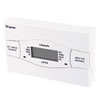
This decides when the boiler is able to run. Whenever the boiler is firing it is using energy and whenever the home is being heated to a temperature that is above what is outside, it will be losing heat to the world. In Spring and Autumn due to the weather conditions, there is no need for the boiler to be on all day, as the house will stay at a relatively warm temperature because of the heat outside. A 7 day timer is recommended to set different patterns for weekdays and weekends. Weekdays will probably need less heat for people working etc and weekends, there may be more activity in the household therefore requires more heating or the other way around. Some timers even allow day to day patterns to be set for each different day of the week. This can be useful for people working part time hours, or for when children get in from school etc. Setting the boiler to heat up when the energy is to be used makes more sense than the heating being on when no one is present. The energy is then being wasted and increasing energy consumption and bills.
Room thermostat
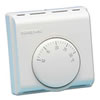
A room thermostat reads the room temperature at a present time, if it reaches above the set temperature (which in an average household should be 20°C/68°F) it automatically stops the boiler operating the central heating.
Thermostat radiator control valves (TRVs)

Thermostat radiator control valves switch individual radiators on and off depending on how warm the room is and where the room is located in the house. For example, a room located above an unheated room (a garage) will require more heat to stay warm than the room above the kitchen or living area, as heat rises. With new individual radiator controls, they allow time and temperature to be set in separate rooms.
Thermostatic controls on the hot water system

These can only be used by households that have a separate hot water tank and not a combi boiler. There purpose is to allow the hot water to be controlled separately from the central heating; therefore the heating would not have to come on to run a bath. Older heating systems only allow the water to be heating when the heating is on.
Weather compensators

Weather compensators or compensation controllers measure the temperature outside the building and vary the temperature of the water pumped into the heating system accordingly. A weather compensated system will provide building occupants with increased comfort levels whilst also reducing the amount of energy consumed as the boiler will fire less often as the system water temperature will be at a lower level.
In order to provide accurate indoor temperatures, the heat supplied to the building must equal the heat loss from the building. The greatest factor affecting how much heat a building requires is the outdoor temperature. Even in a well insulated place, heat loss increases as the outdoor temperature falls.
A boiler heating system is typically designed to always operate at the highest temperature possible to match a buildings heat loss on the coldest days of the year. Most United Kingdom locations have less than 10 days in a year that actually require this high temperature.
So what happens when the outdoor temperature is relatively mild? The heating system delivers too much heat, therefore overheating the space and costing more money. In commercial or apartment styles buildings, where occupants do not directly pay for heating bills, energy costs increase more as occupants open windows to compensate for overheating conditions.
Weather compensation is a control strategy that continuously adjusts heating system supply water temperatures to compensate providing more heat when its colder and less heat when its warmer. For most of the heating season, the control saves energy by operating at a lower temperature, reducing the amount of heat lost.
Green Energy Generation can offer a wide range of weather compensating controls that operate single boilers, multiple boilers or a mixing device to ensure the proper water temperature is delivered based on the outdoor temperature. These controls are also equipped with additional features such as the automatic boiler differential, to ensure the boiler gets a long efficient on time as well as off time.
These controls not only provide typical savings of 5% up to 30% but also improve comfort to the building occupants by delivering the right amount of heat.
Key Benefits:
- Easy installation and wiring
- Operate the boiler at the lowest possible temperatures to improve efficiency
- Minimise ticking expansion noises in radiators by preventing large temperature savings
- Improve the level of comfort for home owners by better matching the heat requirements based on outdoor temperatures
- Expand boiler life cycle with the automatic differential feature to minimise boiler short cycling.
What we offer
As a renewable energy centre, we can offer our clients a full in depth report on how energy saving can help to reduce energy running costs and what measures are available to undertake to begin to see a benefit.
Our fully qualified DEA (domestic Energy Assessors) survey a property from top to bottom, inside and out to give you the homeowner, advice on how to combat energy wastage, increase comfort in your home and ultimately reduce household bills!
Green Energy Generation can help you with not only the survey and advice, but the actual works that are recommended too, at cost effective prices using only the best technologies on the market!
So if you are interested in saving money, reducing bills, cutting carbon emissions or just a heads up in the right direction, why not get involved now by contacting us at Green Energy Generation to assess your property, and find out what simple, no cost or little cost measures can be implemented in your home to see a difference!
If you would like help with energy saving, please call us on 01670 828695 (Northumberland), or 01751 432096 (North Yorkshire).







